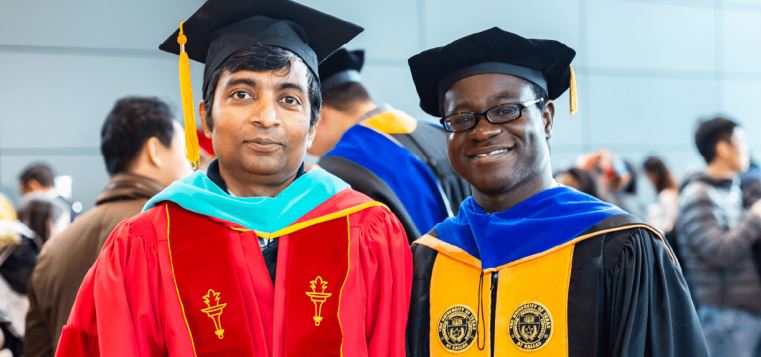Jonsson School Researchers to Debut Groundbreaking Cybersecurity Curriculum

The Bureau of Labor Statistics predicts the U.S. will have a shortage of 500,000 or more cybersecurity talent in 2021. To help train cybersecurity professionals, Dr. Latifur Khan, professor of computer science and director of the Big Data Analytics and Management Lab at The University of Texas at Dallas, is enhancing the University’s curriculum through interdisciplinary courses that focus on high-demand areas such as blockchain, machine learning, cryptocurrency, artificial intelligence (AI) and many more.
“We need to fill the gap, especially in blockchain,” said Khan, also director of security analytics in the University’s Cyber Security Research and Education Institute (CSI). “Blockchain is cutting-edge technology, so there will be an obvious shortage of people in that area.”

Dr. Bhavani Thuraisingham, professor of computer science, Founders Chair in Engineering and Computer Science and founding executive director of CSI, said the initiative will incorporate critical training across the department’s course offerings.
“Blockchain is emerging as a critical security technology for numerous applications in many vertical and horizontal sectors, including finance, health care, AI and Internet of Things, or IoT,” said Thuraisingham, who is also a co-principal investigator of the project. “We are not only preparing a flagship course in blockchain technologies, but also will offer modules in blockchain in several of our key cybersecurity courses.”
Another co-principal investigator is Dr. Murat Kantarcioglu, UT Dallas professor of computer science and member of CSI who also conducts extensive research on the foundations and applications of blockchain.
RETOOLING THE CYBERSECURITY PROGRAM
The new cybersecurity courses are planned to launch during the fall of 2021. Khan and a small team of graduate students are integrating learning modules, presentations and recent publications on data mining and cloud security.
Some of the blockchain and related smart contract work — the digital rules that blockchain is built on — was created by Gbadebo Gbadero Ayoade PhD’19, who now works as a cloud engineer for Google.
Ayoade’s dissertation includes work on blockchain. The first part explores protecting data generated from IoT with blockchain, and the second part consists of protecting smart contracts applications that execute within the blockchain.
Khan served as his thesis advisor, along with Dr. Kevin Hamlen, Louis A. Beecherl Jr. Distinguished Professor of Computer Science and member of CSI.
“Under Professor Khan, I worked on frameworks used in processing large-scale data such as Hadoop and Spark, which were very useful for me considering the amount of data Google manages,” Ayoade said. “Under Professor Hamlen, I worked on software security, and I applied big data and machine learning methods in mitigating attacks against software.”
The comprehensive curriculum will encompass several areas: blockchain and cryptocurrencies (Bitcoin, Ethereum), identifying arithmetic vulnerabilities, filecoin, Byzantine fault tolerance, cloud security and more. The classes will include labs featuring hypothetical scenarios, as well as real-life problems and case studies.
“Dr. Khan and Dr. Hamlen are world-renowned experts in the areas of large-scale data processing and software security,” Ayoade said. “By developing the curriculum, they will disseminate knowledge that will help build secure and scalable systems of tomorrow.”
TIMING IS EVERYTHING
While attending conferences such as the Institute of Electrical and Electronics Engineers and the Association for Computing Machinery, Khan met with many individuals working in the blockchain area.
“We need to cover introductory concepts of blockchain,” Khan said. “Then we will study some of the cybersecurity aspects like how blockchain is compromised, how we can detect and prevent a security breach, as well as some potential cybersecurity applications.”
To engage prospective students, Khan plans to discuss the courses at both industry and academic conferences. Later, he envisions inviting local high school students to summer workshops that focus on basic concepts and trending technologies. These new programs will undoubtedly help address the current cybersecurity workforce shortage.
The initiative is funded by two grants from the National Science Foundation and the CyberCorps® Scholarship for Service program.
Source | Erik Jonsson School Research Magazine
ABOUT THE UT DALLAS COMPUTER SCIENCE DEPARTMENT
The UT Dallas Computer Science program is one of the largest Computer Science departments in the United States with over 4,000 bachelors-degree students, more than 1,010 master’s students, 140 Ph.D. students, 52 tenure-track faculty members, and 42 full-time senior lecturers, as of Fall 2021. With the University of Texas at Dallas’ unique history of starting as a graduate institution first, the CS Department is built on a legacy of valuing innovative research and providing advanced training for software engineers and computer scientists.
Blockchain Explained
Since 2008, blockchain has been in the news. Based on a peer-to-peer (P2p) topology, blockchain is a distributed ledger technology. It’s also a public register of data that is distributed between thousands of computers all connected to network. “Blocks” on the blockchain comprise digital pieces of information.
Blockchain works as a worldwide computer. It is not owned by a single entity but rather is formed by multiple independent computers talking to each other on a network. whenever a transaction is made, the information is broadcast to the network. Each transaction is verified by nodes of the network through running complex cryptography algorithms. Cryptocurrencies such as Bitcoin are used to perform everyday financial transactions.
Importantly, blockchain leads to applications far beyond cryptocurrencies. From medicine to supply chain management to finance, numerous sectors are looking for ways to integrate blockchain into their infrastructures. Blockchain is leading a new technological revolution.




